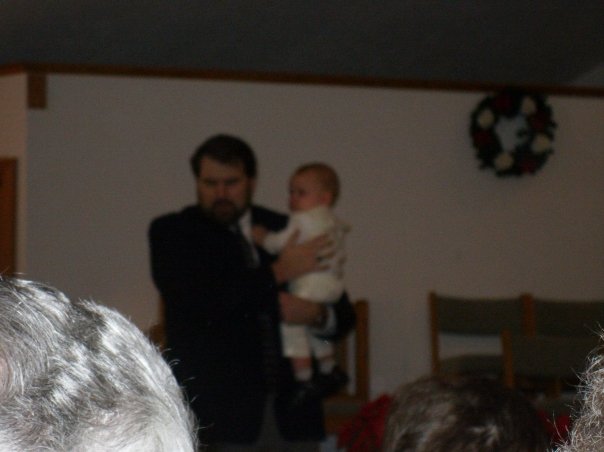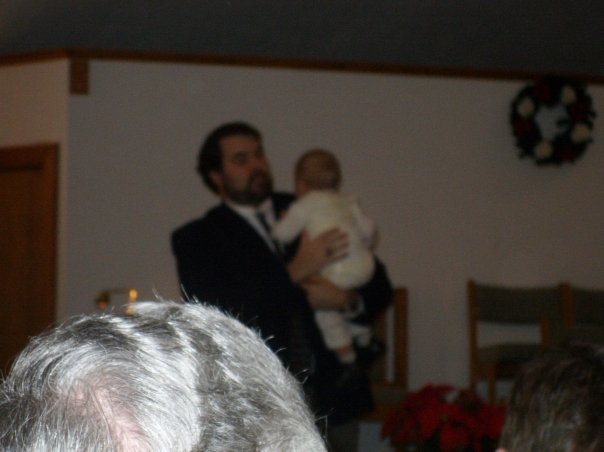Monday, August 29, 2011
Today's Sermon: The Elders' Right and Responsibility to Exercise their God-given Authority
http://cl.ly/9h37
Friday, August 20, 2010
Some Early Thoughts on the Possibility of a Reformed Seminary in West Virginia
The State of Reformed Theology in the State of West Virginia
I know there are 10 churches affiliated with the Presbyterian Church in America (my denomination). There are two Orthodox Presbyterian churches. One Evangelical Presbyterian church. One Reformed Baptist Church. Perhaps three or four independent Baptist churches that have Reformed leanings, but do not claim to be creedally Reformed. There are dozens of churches affiliated with the Presbyterian Church in the United States of America, but who knows how many of these are actually Reformed or even embrace the most basic Christian doctrines. So the State of West Virginia has a very meager Reformed presence. Why?
- It is difficult to find pastors for Reformed Churches in our State.
- It is hard to bring them in from the outside because there is a dearth of Calls within the State. Even when Calls are available, West Virginia doesn’t tend to attract people easily. There are not a lot of churches and not a lot of ministers for those churches. Five of our ten PCA churches are without pastors at the moment, so they are being filled by “stated supply,” which is a sort of interim. The vast majority of the dozens of PCUSA churches in the State are filled by lay-pastors, interims, and stated supply. This is probably because they are too small to support full-time, ordained teaching elders.
- It is hard to bring them in from the outside because most of those churches are not able to support full-time pastors. Low salaries do not attract pastors who need to support families.
- It is hard to bring them up from the inside because educational standards are poor within the State. West Virginia trails the nation in the percentage of college graduates. People who do not go to college cannot go to seminary. Someone who “desires the office of a bishop” has a long row to hoe before he can even begin to consider pastoring a church—at least 7 to 10 years of undergraduate and graduate education. Who wants to bother with this? It is a tough and rare achievement even in States with higher rates of college completion. How much more in a State where college degrees are few and far between.
- It is also hard to bring them up from the inside simply because Reformed theology is not widely understood even in Reformed churches. That leads to the second observation.
- West Virginians have a hard time accepting Reformed Theology and Presbyterianism. Why? I am not dogmatic, but I wonder if the following has any merit:
- Our Appalachian culture has been dominated by easier theology. Frankly, we are flooded with free-will theology, churches, and culture. Baptistic churches have spread throughout our State in part because there are no universal ordination standards, such as seminary education, and because baptistic theology is easier to both preach and digest. "Low ordination standards" means that literally anyone can be a preacher and a pastor. Baptistic churches can and have spread quickly and easily. It also means that their preachers and pastors tend to be unschooled in theology and exegesis. In many cases, West Virginia preaching is simplistic, containing very little theological instruction or exegesis. People have been digesting this type of preaching for decades. It is all they know. Bring in something different and people immediately recognize it. And that is not a good thing in their eyes. They may be getting the Word of God more richly and deeply than they ever have before, but they will still yearn for "hard preaching" and a some good ol' fire and brimstone. Can I get an "Amen?"
- The result is that Reformed theology is an affront to widely accepted and deeply pervasive free-will theology. Election is a bad word, as is the word "doctrine." The local Christian bookstore owner assured me that her Sunday School Quarterlies don't contain "doctrine." She said that as if it were a good thing, revealing at the same time that she was unaware of what the word "doctrine" even means. Even in Presbyterian churches, many congregants are suspicious of Reformed doctrines that have been taught elsewhere for centuries.
- There might also exist a blue-collar distrust for white-collar Presbyterian ministers. This is compounded by the simple fact that any serious attempt to teach theology must include terminology and complexities that many see no practical need for or have a difficult time understanding. The education and experience of those who labor in the Word varies so widely from those who labor with their hands that it is qualitatively different in comparison. This difference is not always viewed favorably.
- I also do not want to underestimate the dark and difficult history of West Virginia. Our history flavors who we are as West Virginians. I would even speculate that the deeply ingrained historical animosity between Company men and miners might play some sort of a role in the entire culture. Sometimes I wonder if the Presbyterian distinctions between ordained ministers and laymen might mirror the Company/miner distinction in disadvantageous ways. Is overarching presbytery action inherently perceived as analogous to Company dictates and abuses of power? This is union country. The Presbytery, by analogy, might be the Company. Union members are raised to distrust the company from their earliest years.
In short, our more complex theology and higher ordination requirements, among other cultural distinctives, might be responsible for reformed theology's lack of success in this State. But it does not seem that a simpler theology and lower education requirements would fix this problem. A simpler theology would be less likely to be a Reformed theology. Similarly, lower education requirements would eventually result in a simpler theology and less Reformed theology. One of the reasons we have such high education requirements is because it enables the preservation of the Reformed faith.
Friday, July 2, 2010
Essays Published
Why Presbyterians Only Baptize Once
Why Presbyterians do not Believe that Baptism Regenerates Souls or Remits Sins
Monday, March 22, 2010
Content of a Personal Letter from Gordon H. Clark
 While perusing a book that once belonged to a seminary student of Dr. Gordon H. Clark (1902-1985), I found lodged within its pages two folded letters--one from the student to Clark, and Clark's handwritten three page reply on unlined typing paper. Given Clark's prominent influence in twentieth century Reformed theology, I have reproduced the content of the letter here.
While perusing a book that once belonged to a seminary student of Dr. Gordon H. Clark (1902-1985), I found lodged within its pages two folded letters--one from the student to Clark, and Clark's handwritten three page reply on unlined typing paper. Given Clark's prominent influence in twentieth century Reformed theology, I have reproduced the content of the letter here.10/28/82
Dear [Redacted],
Your questions remain on the same subject, but they or some of them appear confused. Did you read my exegesis of Eph. 3:9-10 in What Do Presbyterians Believe? Because I am not clear as to the precise point that troubles you—and there are many points in the complicated subject—I shall begin with a very prevalent confusion, but one that seems to me very easy to answer. You ask, Does God condemn man before he decrees the fall? The word before here causes trouble, for it introduces an element of time in a non-temporal situation. Several theologians it is true insist that the problem is logical and not temporal, but then they either follow a temporal order, or as often fail to say what they mean by logical order. Once a person grasps the order, i.e. what the word order means, the problem is easily solved. This I have done in WDPB above.
The importance of logic as distinct from time is found also in the doctrine of the Trinity. Even Gregory of Nyssa, who wrote more on the Trinity than any else ever did, either confused them (sometimes) or thought that everybody else confused them and so [returned ?] again and again instead of completing the doctrine as a whole.
You are right when you say “In the supra’s view, to discriminate comes before the decree to permit the fall.” That is, you are correct except for the word permit. Calvin made it quite clear that there is no such this as permission with God. One who tries to use this idea is sure to be confused, for when it is logically followed, the result is Arminianism or worse.
Rejecting temporal distinctions in God one cannot agree with your wording—which may really express your own position—that “God only looks at one thing at a time and then moves on . . .”
I do not quite see the relevance of your next paragraph on creation. The best I can say is that Genesis seems to say there were three acts of creation, with developments in between.
With respect to the last paragraph on p. 1, I would say that Eph. Is not the only passage that helps this discussion along, though it is, I believe, the clearest expression of God’s motive in creating. But there all sorts [sic] of hints and inferences that must be woven into one complete doctrine.
The lump of clay is of course only an illustration. A potter can make something good or something bad out of it. So also God can make a good man or a bad man, though the literal clay illustration fits a man’s body only. The point of the comparison is that the question of justice cannot be raised against a potter by a lump of clay.
The outline of Romans may help you on your p. 2. Rom 1-3 states the main doctrine of justification and continues with Abraham as an illustration in Rom 4, with comparison between Adam/Christ in Rom. 5. Then comes a major break. No longer expounding the doctrine, Paul takes up two objections (1) antinomianism in chapters 6, 7, 8. (2) his doctrine is inconsistent with the OT, answered in chapters 9, 10, 11. Esau was condemned, not because he had voluntarily committed some sin, but because he was guilty of Adam’s original sin. Jacob was saved, not of course because of any good he did, but because God imputed Christ’s righteousness to him.
Finally you refer to II Peter 5:9. Keep in mind (1) that Peter sent his letters to Christians. He is talking to them and about them (2) In this very sentence he says, “God is longsuffering to us-ward, not willing that any (of us) should perish.” The verse has nothing whatever to do with universalism.
Now I hope this is of some help, and of you have further questions, send me your next chess moves soon.
Cordially,
G.H. Clark
Wednesday, September 16, 2009
Why Presbyterians Do Not Believe that Baptism Regenerates Souls or Remits Sins
 From time to time I run into Christians who believe that people must be baptized in order to be saved. We call this “baptismal regeneration,” because they believe that the act of baptizing in some way changes the heart. This position is fairly widespread outside of Baptistic and Reformed circles. The Roman Catholic Church believes that when infants are baptized, their original sin is washed away. Among other protestant denominations, the Church of Christ, Disciples of Christ, Christian Church, and Lutherans affirm some form of baptismal regeneration.
From time to time I run into Christians who believe that people must be baptized in order to be saved. We call this “baptismal regeneration,” because they believe that the act of baptizing in some way changes the heart. This position is fairly widespread outside of Baptistic and Reformed circles. The Roman Catholic Church believes that when infants are baptized, their original sin is washed away. Among other protestant denominations, the Church of Christ, Disciples of Christ, Christian Church, and Lutherans affirm some form of baptismal regeneration.
Occasionally I run into confused people even in Presbyterian churches. They have often come to Presbyterianism from more baptistic denominations in which it is not unusual to view infant baptism with suspicion, and where they may mistakenly come to believe that we teach some type of baptismal regeneration.
Wednesday, September 2, 2009
Why Presbyterians Only Baptize Once
 This topic comes up in response to questions I have received from church members while studying the Westminster of Confession of Faith together on Wednesday nights. The Confession states, “The sacrament of Baptism is but once to be administered unto any person” (XXVIII:7). The Presbyterian Church in America requires its ordained teaching elders to subscribe to this statement from the Confession. This means that PCA teaching elders cannot rebaptize anyone who has already received a valid baptism during their lifetime. A valid baptism is defined as an ordained minister applying water to someone in the name of the Father, Son, and Holy Spirit.
This topic comes up in response to questions I have received from church members while studying the Westminster of Confession of Faith together on Wednesday nights. The Confession states, “The sacrament of Baptism is but once to be administered unto any person” (XXVIII:7). The Presbyterian Church in America requires its ordained teaching elders to subscribe to this statement from the Confession. This means that PCA teaching elders cannot rebaptize anyone who has already received a valid baptism during their lifetime. A valid baptism is defined as an ordained minister applying water to someone in the name of the Father, Son, and Holy Spirit.The Church has been baptizing infants since its earliest days. Following the Reformation, a group of Christians began teaching that infant baptism was not biblical and that Christians should only be baptized after they made a profession of faith in Christ. These people were called “Anabaptists” (“ana” means “again” in Greek) because they believed in rebaptizing or “baptizing again” those who had already been baptized as infants. Although these Anabaptists are not the same as today’s Baptists, Baptists do believe something similar: that infant baptism is not valid, and that anyone who has been baptized as an infant must be rebaptized after their conversion and before they can join a Baptist church. Today, most people who rebaptize attend baptistic churches. However, some in Presbyterian churches also believe that rebaptism is appropriate or even necessary. Why is this so?
Click here to read the rest of the article.
Monday, December 29, 2008
Wet Babies!

Ethan Deal was baptized at Winifrede Presbyterian Church on December 28, 2008. Right afterwards, I baptized Caleb Knapp. I then preached the first of two sermons on "Why We Baptize our Children." We have three more baptisms on January 25, when I will preach part two. It was a wonderful, humbling, and exciting experience. I thank God for the privilege and hope to be able to baptize many more in the years ahead.



